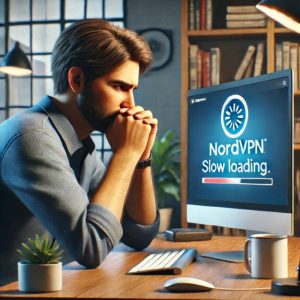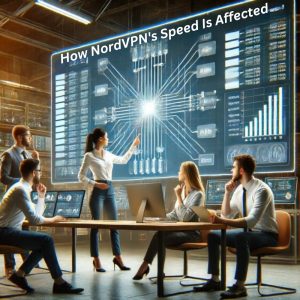NordVPN is Slow
In the today’s interconnected world, Virtual Private Networks (VPNs) are crucial tools that ensure our online activities remain private and secure. NordVPN, one of the leading VPN services, provides users with robust encryption and the ability to surf the web anonymously. However, users often encounter a common issue: NordVPN is slow. This can be annoying, especially when you depend on fast internet speeds for streaming, gaming, or secure browsing.

There are several reasons why NordVPN slows down internet speeds. It could be due to the distance between the user and the VPN server, server load, or the encryption process that secures your data but also adds overhead. Additionally, factors like your original internet speed, the time of day, and even your hardware can play a role. Understanding why NordVPN is slow is essential for troubleshooting and finding a solution.
The importance of addressing NordVPN slowing down internet cannot be overstated. Slow internet not only disrupts your streaming and browsing experience but can also affect the performance of work-related tasks that depend on a stable and fast internet connection. Optimizing VPN speed is crucial to ensure that the balance between security and performance is maintained, allowing you to enjoy both the privacy of a VPN and the efficiency of a fast internet connection.
By investigating common causes and implementing effective solutions, users can enhance their experience, proving that it’s possible to have both security and speed in a VPN service. Addressing the issue of NordVPN is very slow not only improves usability but also customer satisfaction, making it a critical aspect of VPN maintenance.
Understanding How NordVPN’s Speed Is Affected
Virtual Private Networks (VPNs) are critical tools in maintaining online privacy and security. They operate by routing your internet traffic through an secure tunnel to a server operated by VPN provider, often located in a different geographic location. This process, while enhancing security and privacy, can sometimes affect internet speeds. Understanding how and why VPNs can lead to NordVPN slow internet speeds is crucial for optimizing your online experience.
How NordVPN Work
When you connect to a VPN, your data is encrypted before leaving your device, traveling to VPN server where it is decrypted and delivered to its final destination. This journey, although securing your data against external threats, can add significant overhead. The encryption and decryption process requires processing power, which can contribute to NordVPN slowing down internet speeds. This is a fundamental aspect to grasp when troubleshooting why NordVPN is slow.

Factors Contributing to NordVPN Speed Degradation
-
NordVPN Server Distance:
The physical distance between your device and the VPN server can greatly influence your connection speed. The greater the distance, the more time it takes for data to travel back and forth, which can lead to NordVPN slow speed experiences. Choosing a server closer to your location may help mitigate this issue.
-
NordVPN Server Load:
The number of users sharing the same VPN server can also impact speed. If a server is overloaded, the increased traffic can slow down your internet connection, contributing to NordVPN slows down internet issues. Opting for less crowded servers can often provide a quicker and more reliable connection.
-
NordVPN Protocol:
The type of VPN protocol you choose affects your speed and security. Protocols like OpenVPN might offer stronger security, which could lead to slight speed reductions. On the other hand, newer protocols such as WireGuard are designed to provide fast speeds along with robust security. Selecting the right protocol can help maintain an optimal balance between security and speed, reducing concerns about NordVPN slowing internet.
-
Encryption Strength:
Stronger encryption offers better security but it requires more processing power, which can slow down your internet speed. NordVPN offers various levels of encryption strength, allowing users to choose a suitable level that does not overly compromise speed.
-
Incorrect NordVPN Configuration Settings:
Improper configuration of your NordVPN settings can also lead to NordVPN being extremely slow. Common mistakes include using the wrong VPN protocol for your needs or having incorrect network settings. Ensuring that your configuration matches the recommended settings for optimal performance can significantly enhance your speed. Review and adjust your VPN settings, such as choosing the right protocol (e.g., OpenVPN for security, NordLynx for speed), to avoid NordVPN slowing internet unnecessarily.
-
Outdated NordVPN App:
Lastly, using an outdated version of the NordVPN app can result in NordVPN running slow. Each update not only brings enhancements and new features but also optimizes performance to ensure faster and more reliable connections. Make sure your NordVPN app is up-to-date to take advantage of latest improvements and security patches, preventing issues where NordVPN is super slow.
By understanding these key factors, users can better manage their expectations and settings, leading to improved internet speeds while using VPN services. Addressing these issues is essential in resolving the common query of why is NordVPN slow and ensuring that your internet experience is both secure and efficient. Adjusting these factors appropriately can greatly diminish the impact of NordVPN slowing down internet, making your online activities smoother and faster.
How to Test and Diagnose Slow VPN Speed
Experiencing a NordVPN slow connection can be frustrating, especially when you’re not sure why it’s happening. To effectively diagnose and address these issues, it’s crucial to know how to accurately test your VPN speed. This section will guide you through the methods and tools you can use to pinpoint the source of NordVPN slow performance and how to potentially rectify it.

Speed Test Methods
Testing your VPN speed is the first step in diagnosing a NordVPN slow to connect issue. Several online tools are available to help you measure the actual speeds you’re getting while connected to NordVPN. Tools like Speedtest by Ookla, Fast.com, or NordVPN’s own speed test feature allow you to get a quick read on your current upload and download speeds. When using these tools, ensure that you perform tests both with and without the VPN active. This will give you a baseline to understand how much your speed is affected by the VPN. If you find that NordVPN download speed slow is significantly below expectations, this could indicate an issue with your VPN configuration or external network factors.
Comparative Testing
To further diagnose why your NordVPN is slow, conduct comparative tests by changing different variables:
-
Different Servers:
Connect to various NordVPN servers across different countries and compare the speeds. This will help you determine if the issue is related to specific servers or a general slowdown across all servers.
-
Different Protocols:
NordVPN offers several protocol options, including OpenVPN, IKEv2/IPsec, and NordLynx. Switch between these protocols to see which offers the best performance. A NordVPN slow download problem might be mitigated by simply switching to a more efficient protocol like NordLynx, which is known for its speed and security.
-
Different Settings:
Adjust your VPN settings, such as toggling between TCP and UDP connections in the NordVPN app, or enabling/disabling features like CyberSec to check their impact on speed.
By methodically altering and testing these variables, you can identify specific reasons why NordVPN is slowing internet access. For instance, if changing to a server closer to your physical location improves speed, then the problem may have been due to high latency on distant servers. Similarly, if switching protocols enhances speed, the previous protocol may not have been optimal for your connection type or device.
Understanding and applying these testing methods will help you not just figure out why is NordVPN slow but also how to improve your connection speeds. Regularly performing these tests can also prevent future issues, ensuring that you maintain an efficient and reliable VPN experience.
Practical Solutions to Improve NordVPN Speed
When facing issues where NordVPN is slow, it can hinder your internet experience, affecting everything from browsing speed to streaming quality. Fortunately, several practical solutions can be implemented to enhance the speed and efficiency of your NordVPN connection. Here’s how you can address the common problem of NordVPN slowing internet speeds.

Choosing the Right Server for NordVPN
The choice of server is a significant factor in VPN performance. NordVPN slow internet speed can often be attributed to connecting to a server that is either too far away or overloaded with users. To mitigate this:
-
Location:
Always select a server that is geographically closest to you unless you need to appear in a specific location for content access reasons. The shorter distance your data has to travel, the faster your connection will be.
-
Server Load:
NordVPN provides information on server load within their app, allowing you to choose a server with the least traffic. Opting for a server with lower load can dramatically reduce issues like NordVPN making internet slow.
Adjusting NordVPN Security Settings
The level of encryption can also affect your internet speed. While you wouldn’t want to compromise on security, finding the right balance can prevent your NordVPN from running slow:
-
Encryption Level:
Experiment with different encryption settings if available. Sometimes, a slight reduction can improve speed without a significant drop in security.
NordVPN Network Configuration
Adjusting your network settings can also help in improving VPN speed:

-
Port Selection:
Some ports might be faster or less congested than others. You can change the ports used by the VPN protocol, which might help if your NordVPN makes my internet slow.
-
Split Tunneling:
This feature allows you to choose which apps go through the VPN. Using split tunneling to exclude high-bandwidth activities like streaming or gaming from the VPN can improve speeds for those activities without compromising the security of other data.
Using Wired Connections
Finally, the type of your internet connection can influence the performance of your VPN:
-
Stability and Speed:
Wired connections are generally more stable and faster than wireless ones. If you experience NordVPN running slow, switching from Wi-Fi to wired Ethernet connection can provide a more stable and quicker link, reducing latency and speed issues. If you’re experiencing connectivity issues, consider reading our detailed blog post on NordVPN Not Connecting to find the solution.
Implementing these solutions can effectively address the problem of NordVPN slowing internet and enhance your overall VPN experience. Regular adjustments and tests will help maintain optimal performance and ensure that your internet speed is as fast as possible while secured by NordVPN.
FAQs
Q. Why is my NordVPN connection so slow?
- A: If you’re experiencing NordVPN slow speed, common reasons include high server load, a faraway server, or your current VPN protocol. Adjusting these settings can often improve your connection speed significantly.
Q. What can I do if NordVPN slows down my internet?
- A: To address NordVPN slowing down internet, switching to a server closer to your location, use the NordLynx protocol for faster speeds, and ensure your NordVPN app is up-to-date.
Q. How can server selection impact NordVPN slow internet speed?
- A: Choosing a server with lower load and closer geographical proximity can greatly reduce issues related to NordVPN slow internet speed. Servers that are far or overcrowded tend to perform slower.
Q. Why does NordVPN make my internet slow when streaming or downloading?
- A: NordVPN making internet slow during high-bandwidth activities like streaming or downloading is often due to server load or insufficient configuration. Opting for optimized streaming servers and adjusting your VPN settings can help.
Q. What are the best settings to fix NordVPN slow issues on Windows 10?
- A: To fix NordVPN slow issues on Windows 10, ensure that your NordVPN app is updated, switch to the NordLynx protocol, and select servers that are geographically nearer and less crowded.
Q. Can outdated NordVPN apps cause NordVPN slow connection issues?
- A: Yes, an outdated NordVPN app can lead to a NordVPN slow connection. Regular updates are crucial as they contain performance enhancements and new features that can speed up your connection.
Q. How does changing VPN protocols help if NordVPN is very slow?
- A: If NordVPN is very slow, changing from a protocol like OpenVPN to NordLynx can offer better speed due to NordLynx’s more efficient handling of data and connections.
Q. What should I do if NordVPN is slow to connect?
- A: If NordVPN is slow to connect, check your network settings, try restarting your router, and switch to a server with less load. Sometimes, resetting the NordVPN app can also help.
Q. How can I improve NordVPN download speed slow on my Firestick?
- A: To improve NordVPN slow download speed on Firestick, connect to a closer server, reduce encryption strength if possible, and ensure your Firestick and NordVPN app are both up-to-date.
Q. Why is my NordVPN extremely slow despite a fast internet connection?
- A: Even with a fast base internet connection, factors like NordVPN extremely slow server response, high encryption overhead, or ISP throttling can degrade your speed. Experiment with different servers and settings to identify and mitigate the issue.
Conclusion
Throughout this guide, we’ve explored the multifaceted reasons why NordVPN is slow and provided actionable steps to diagnose and improve NordVPN speed. Knowing these factors is essential for anyone seeking to optimize their VPN experience. From the impact of server selection to the intricacies of VPN protocols and network configurations, each element plays vital role in the overall performance of your VPN connection.
NordVPN slowing down internet speeds can be a significant hindrance, but it’s often a solvable issue. By choosing the right server based on location and load, adjusting VPN protocols for efficiency, and tweaking security settings to find a perfect balance, users can see substantial improvements. Moreover, optimizing network configurations, such as port selection and implementing split tunneling, along with opting for wired connections, can further enhance connection stability and speed.
We encourage all users to not just settle for the default settings but to actively experiment with different configurations. Each network environment is unique, and sometimes a small adjustment can be the key to significantly fix NordVPN slow issues. Remember, the goal is to achieve balance where your internet speed and VPN security complement each other, ensuring a seamless and protected online experience.
If your NordVPN is very slow, take a proactive approach by applying the insights and solutions discussed here. With these tools and knowledge, you can not only rectify common issues but also optimize your NordVPN’s performance to suit your specific needs, ensuring that you enjoy both the speed and security that VPNs are designed to offer. To know more about NordVPN Slowness and other related issues and solutions, visit our NordVPN Support Page.
